I was thinking the other day about eliminating the butter from my milk breads and remembered the bottle of toasted walnut oil in my cupboard that needed to be used, so I came up with this loaf. I was in a rush out the door at the time I needed to shape this so I did the lazy thing and shaped it as a batard and not into my usual four lobes. I actually quite like how this turned out visually especially when topped with black sesame seeds.
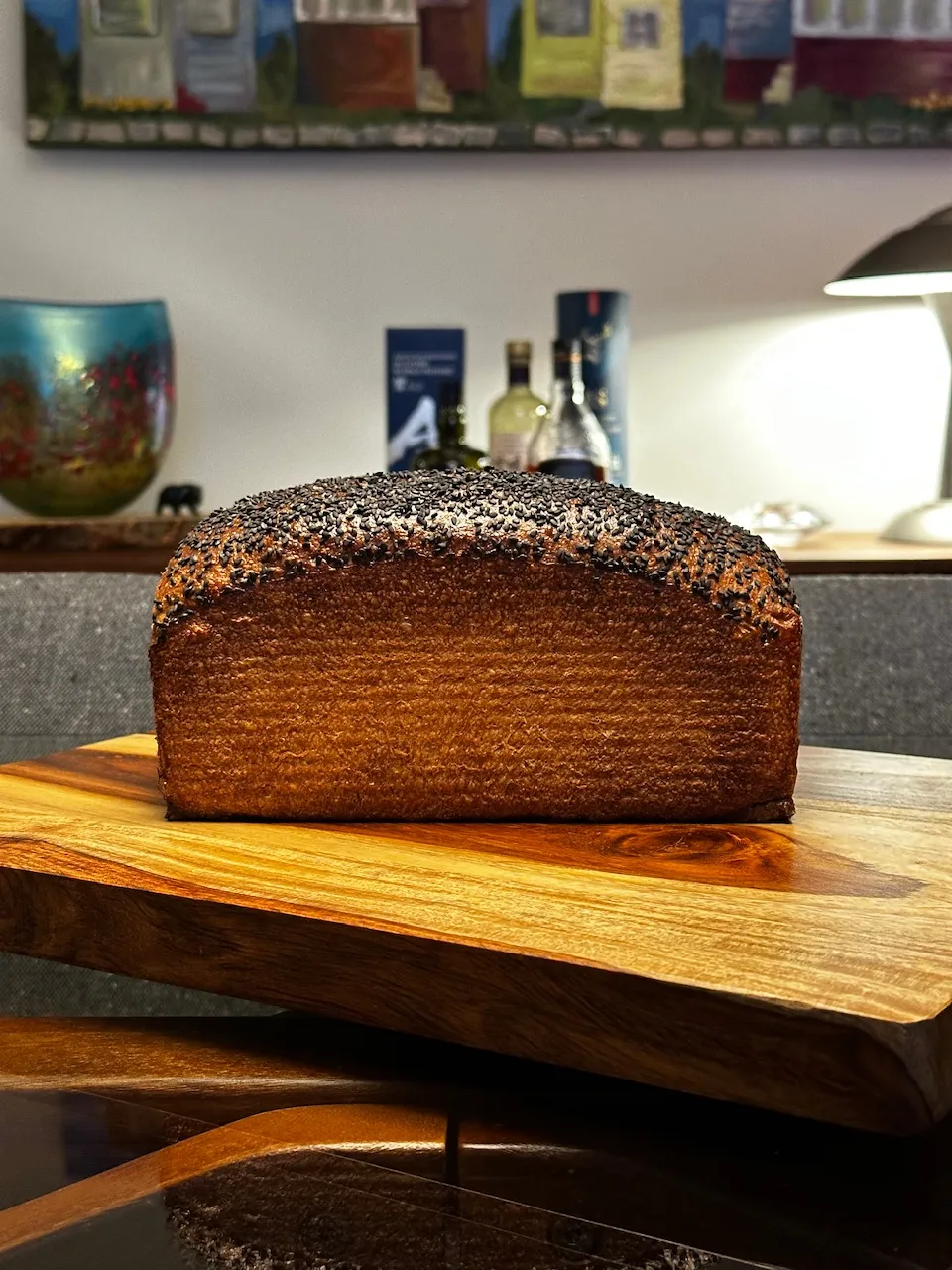
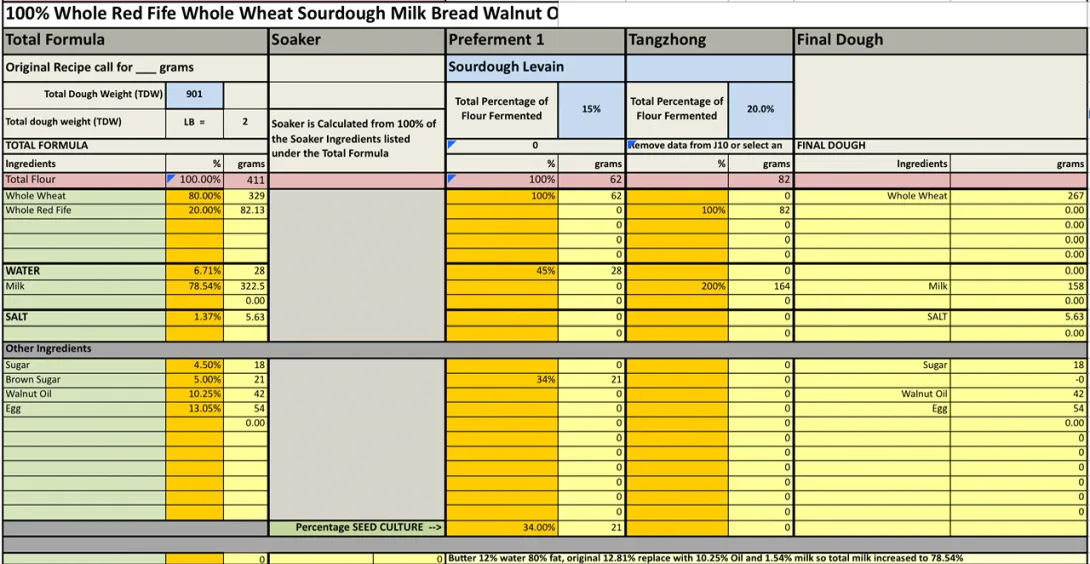
For one 9x4x4” Pullman pan loaf.
Instructions
Levain
Mix the levain ingredients in a jar or pyrex container with space for at least 300% growth.
Press down with your knuckles or silicone spatula to create a uniform surface and to push out air.
At a temperature of 76-78ºF, it typically takes up to 10-12 hours for this sweet stiff levain to be at peak. For my starter I typically see 3-3.5 times increase in size at peak. The levain will smell sweet with only a mild tang.
Tangzhong
In a sauce pan set on medium heat, stir the milk and whole red fife flour until blended. Then cook for several minutes until well thickened, stirring regularly with a spoon or heat-resistant spatula. Let cool in the pan or, for faster results, in a new bowl. Theoretically it should reach 65ºC (149ºF) but I don’t find I need to measure the temperature as the tangzhong gelatinizes at this temperature. You can prepare this the night before and refrigerate it, ensure that it is covered to prevent it from drying out.
If you plan on using a stand mixer to mix this dough, set up a Bain Marie and use your stand mixer’s bowl to prepare the tangzhong.
Dough
In the bowl of a stand mixer, add the milk (consider holding back 10 g of milk and adding later if this is the first time you’re making this), egg, tangzhong, salt, sugar and levain. Mix and then break up the levain into many smaller pieces. Next add the flour. I like to use my spatula to mix until there aren’t many dry areas. Allow the flour to hydrate (fermentolyse) for 20-30 minutes. Mix on low speed and then medium speed until moderate gluten development this may take 5-10 mins. You may want to scrape the sides of the bowl during the first 5 minutes of mixing. Next drizzle in the walnut oil a bit at a time. The dough may come apart, be patient, continue to mix until it comes together before adding in more oI’ll. Again, knead until well incorporated. You will want to check gluten development by windowpane during this time and stop mixing when you get a good windowpane. You should be able to pull a good windowpane, not quite as good as a white flour because the bran will interrupt the windowpane somewhat.
On the counter, shape the dough into a tight ball, cover in the bowl and ferment for 2 - 4 hours at 82ºF. There should be some rise visible at this stage.
You can next place the dough into the fridge to chill the dough for about 1.5 hours, this makes rolling the dough easier to shape. Remember, if you do so the final proof will take longer. Alternatively, you can do a cold retard in the fridge overnight, however, you may find that this increases the tang in your bread.
Prepare your pans by greasing them with butter or oil or line with parchment paper.
Lightly floaf the top of the dough. Scrape the dough out onto a clean counter top and shape as a batard. Transfer to your prepared pan.
Cover and let proof for 4-6 hours at a warm temperature. I proof at 82°F. You will need longer than 4-6 hours if you chilled your dough for shaping. I proof until the top of the dough comes to within 1 cm of the top edge of the pan.
Preheat the oven to 350F and brush the dough with the egg-milk wash. Just prior to baking brush with the egg-milk wash again and then top with black sesame seeds. Score the dough, this is optional.
Bake the loaves for 50 minutes or until the internal temperature is at least 190ºF, rotating as needed to get even browning. Shield your loaf if it gets brown early in the baking process. After 50 mins remove the bread from the pan and bake a further 10 mins by placing the loaf directly in the oven on the rack with the oven turned down to 325ºF.
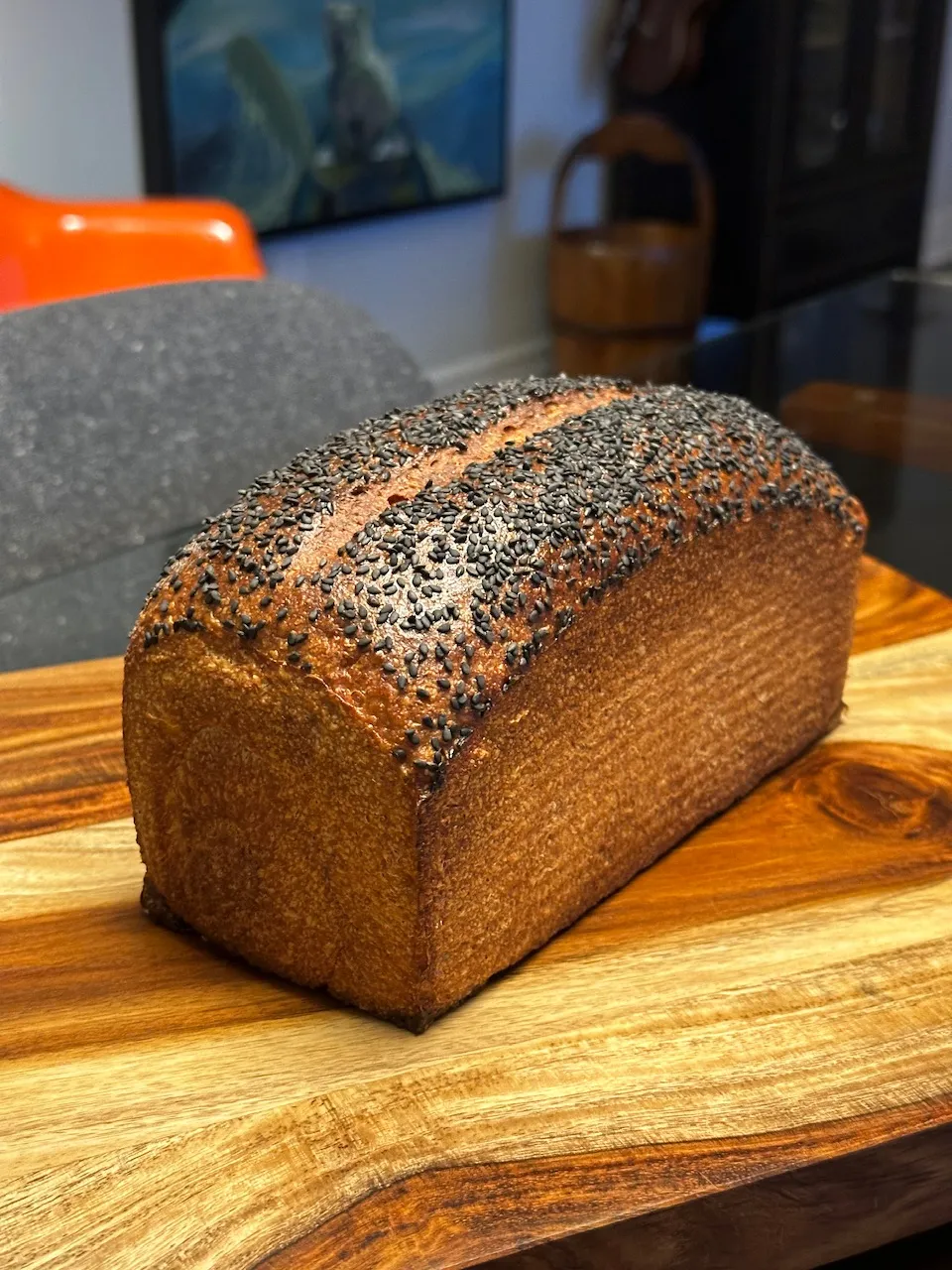
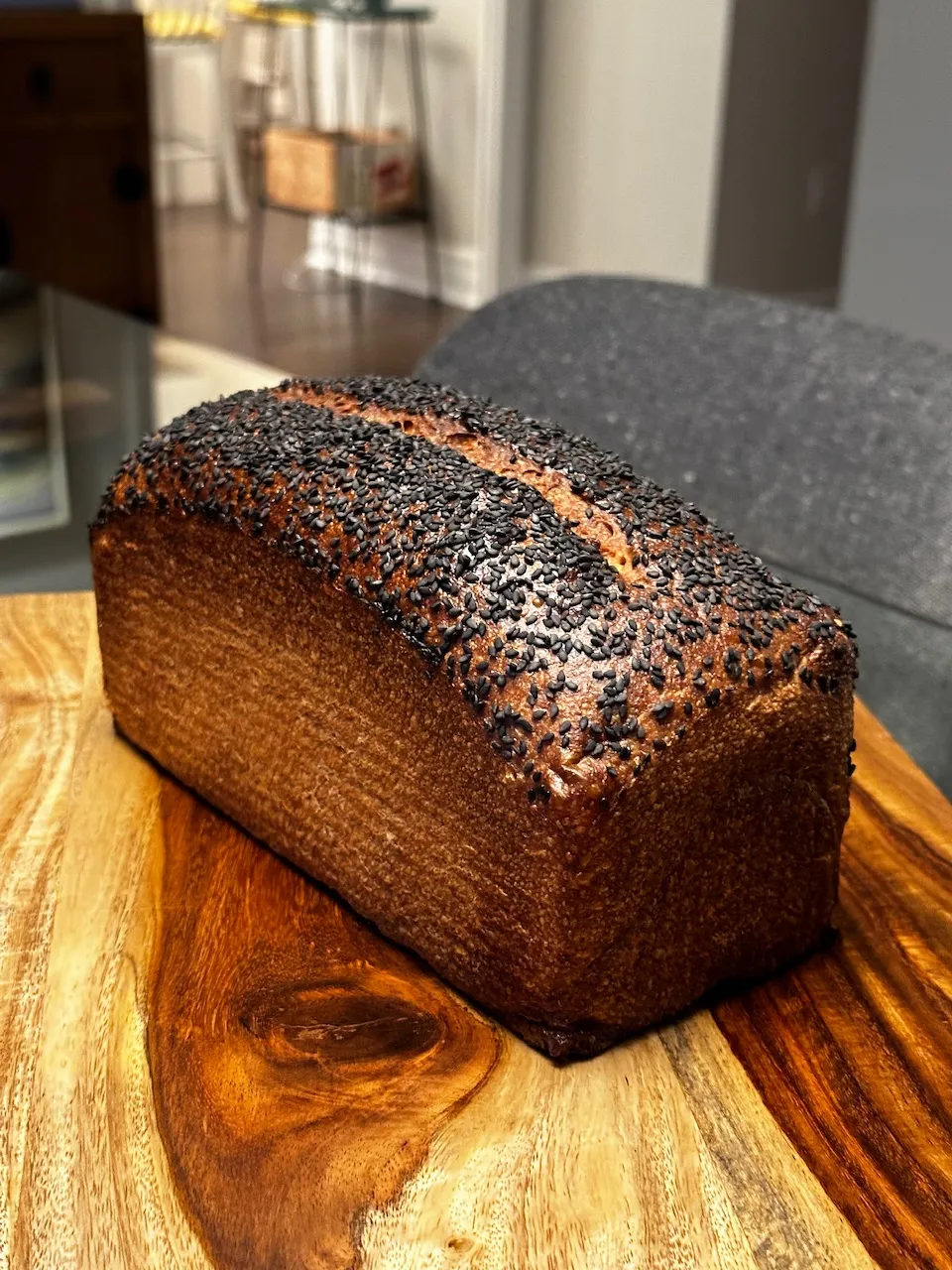
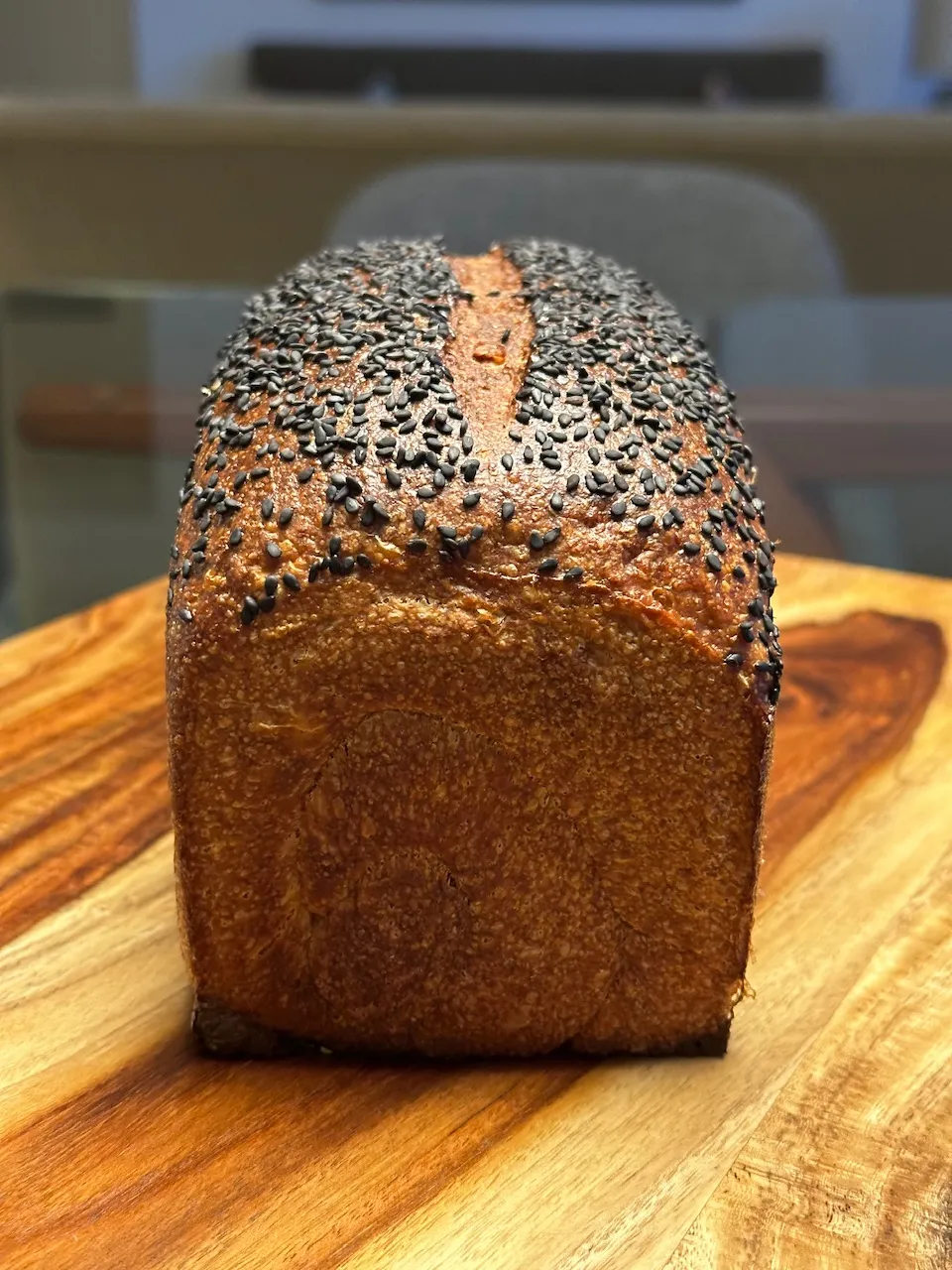
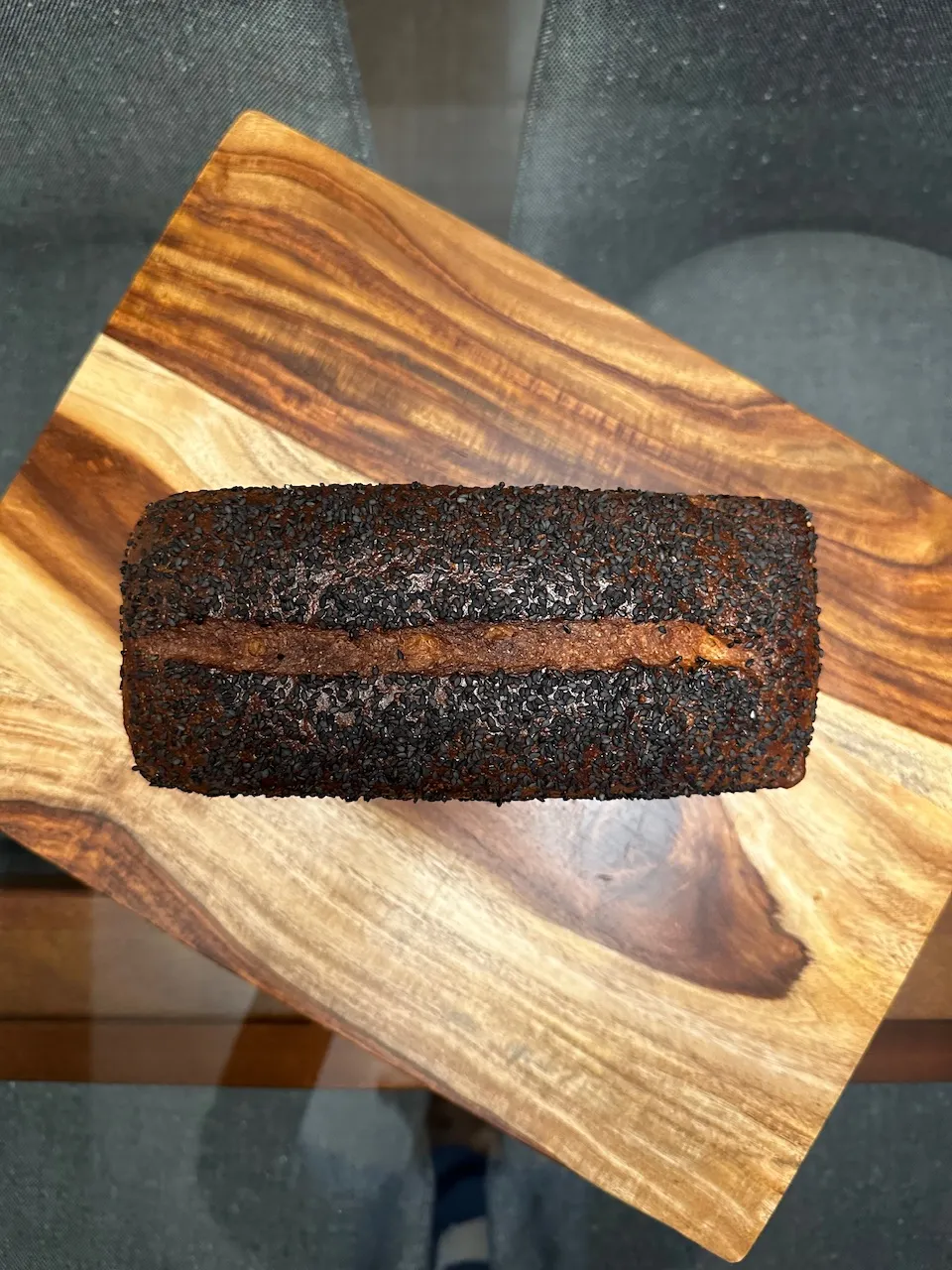
- Benito's Blog
- Log in or register to post comments
The crumb is lovely, more open than my usual milk breads because the dough wasn’t degassed on purpose while shaping. Lovely mild nutty walnut flavour from the oil and less saturated fat since there is no butter. Still has a lovely soft crumb.
Whoa, that may be the most beautiful loaf I've ever seen!
TomP
That’s very kind of you to say Tom, thank you.
Benny
What a beatiful bread. Great idea using walnut oil in place of butter. I can't have milk so I wonder if maybe soy milk could be used instead?
Thank you, definitely use another milk of your choice. When I was working on my vegan version of my milk bread, I used soy milk and it turned out well.
Benny
Thank you, Benny. Good to know!
Sounds delicious and I like the term "Lightly floaf"!
Tony
Thank you Tony, I’m quite pleased with my lower saturated fat shokupan.
Benny
I love the more open crumb on this bake. This looks so inviting and I imagine must taste as good as it looks.
You have really nailed down this style of bread that's for sure!
Best,
Ian
Thank you Ian, I keep baking variations of this because we enjoy eating this style of bread the most. I’ll keep on working on my book LOL.
Benny
One to use, one signed copy? Maybe the first one off the press? Are books numbered like that, I wonder? Beautiful, as always Benny. Kudos go to you!
Thank you Will, that is most kind of you to say.
Benny